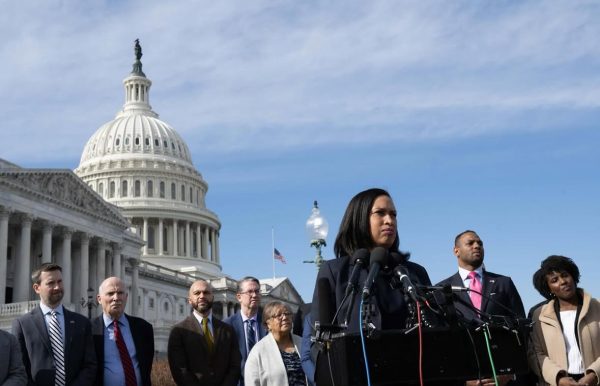The House of Representatives did not address legislation needed to close a $1.1 billion gap in Washington, D.C.’s budget before it adjourned for a two-week recess starting April 15.
D.C. is facing a $1.1 billion budget shortfall for the 2025 fiscal year (FY) due to Congress’ decision to revert the city’s budget, which Congress sets annually, to the FY 2024 budget after the House refused to vote on a new proposal. The budget cuts could impact public transportation and public safety services for Georgetown University students.
D.C. Mayor Muriel Bowser (D), who finalizes the District’s budget pending congressional approval, invoked a 2009 law that permits the city to increase its budget autonomously.

Bowser also aims to reduce spending by $410 million, announcing further measures, including a hiring freeze and suspension of pay raises and overtime pay starting April 27, as well as potential furloughs and facility closures, in an effort to mitigate the impact of the cuts while the House finds a new solution. She urged Congress to restore the city’s full budget authority.
Bowser said in a press release that the proposed budget, which Congress refused to pass, is strategic and intends to create economic growth despite the shortage.
“We are a resilient city,” Bowser said in the statement. “We never give up. We know how to make a strong comeback. But our wins are also not accidental. We’re smart, creative, and strategic. That is the spirit of my fiscal 2025 budget.”
“This is a smart budget, it’s a responsible budget, but most important, this is a budget that will keep D.C. the best city in the world,” she added.
In response to the cuts, City Administrator Kevin Donahue will submit a plan to Bowser by April 25, three days before the House returns from recess, to furlough government workers and shut down government facilities, excluding schools, homeless shelters and health care centers. The plan will include holds on pay raises, promotions, new contracts and select contracting or grant spending not tied to a public benefits program.
Joe Massaua (SFS ’25) — the former Advisory Neighborhood Commissioner for 2E04, which represents the south side of Georgetown’s campus — said he is concerned D.C. neighborhoods that do not get as much national attention will be heavily impacted.
“I worry if D.C. doesn’t have the money to fill budget gaps, not enough money to hire sanitation workers, that services might be cut back in places where they’re not seen and in places that have the most need,” Massaua told The Hoya.
The freeze on overtime pay could have severe consequences for emergency services, police departments and fire departments, such as a lack of 911 operators who rely on overtime pay. Agencies can submit requests for overtime that may be approved, but no agency will automatically be exempt from the restrictions.
Zach Samuel (SFS ’26), who intends to work in government, said the funding cuts would reinforce the notion that the federal government does not prioritize the people in the District.
“The District has always been structurally underrepresented in Congress, and I think that the funding cuts represent that the residents of D.C. don’t necessarily receive the same attention or prioritization that other districts have,” Samuel told The Hoya.
D.C. City Council Chairman Phil Mendelson (D) said at a Committee of the Whole council meeting that by delaying the vote, Congress is trying to cut funds allocated to the D.C. government, which are not for federal use.
“Some people don’t realize this is all local money, not federal money,” Mendelson said. “This is not money that the federal government gets, or gets to keep or revert to the federal treasury. It doesn’t — it’s local money.”
“While Congress, through its mistake, mandated that we have to spend at FY 24 levels — that’s the $1.1 billion reduction — they’re not doing anything with the money,” Mendelson added.
Samuel said he is disappointed by the budget cuts and hopes the larger FY 2025 budget will ultimately be restored.
“It is disappointing to hear that a lot of D.C. residents aren’t going to have access to the same resources that they may have had before, and I hope that this will quickly be reversed,” Samuel said.
Massaua said he worries Congress will continue to neglect the District’s budget and the cut’s consequences.
“I fear for the residents that will see their services cut, and it just seems like there is no plan, so congressional leadership should just fix the mess that they created in the first place because this $1.1 billion cut did not need to happen, and frankly, it was targeted at D.C,” Massaua said.